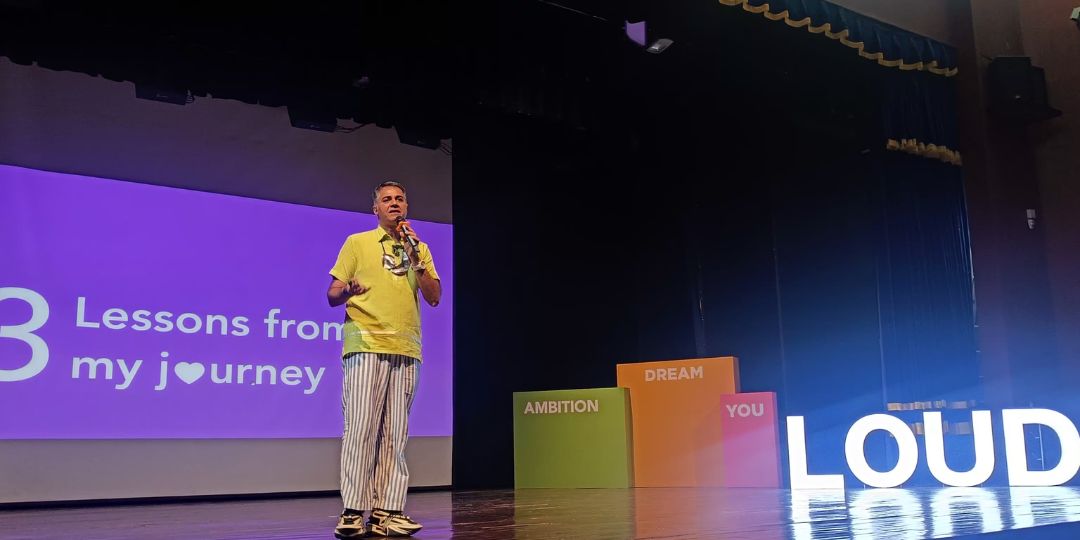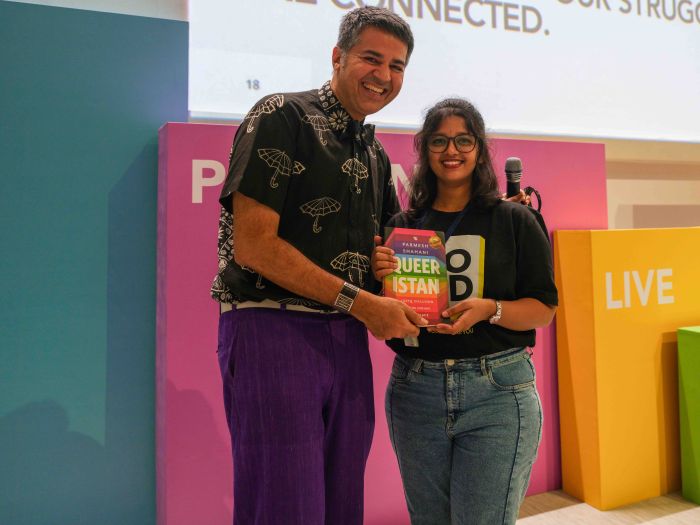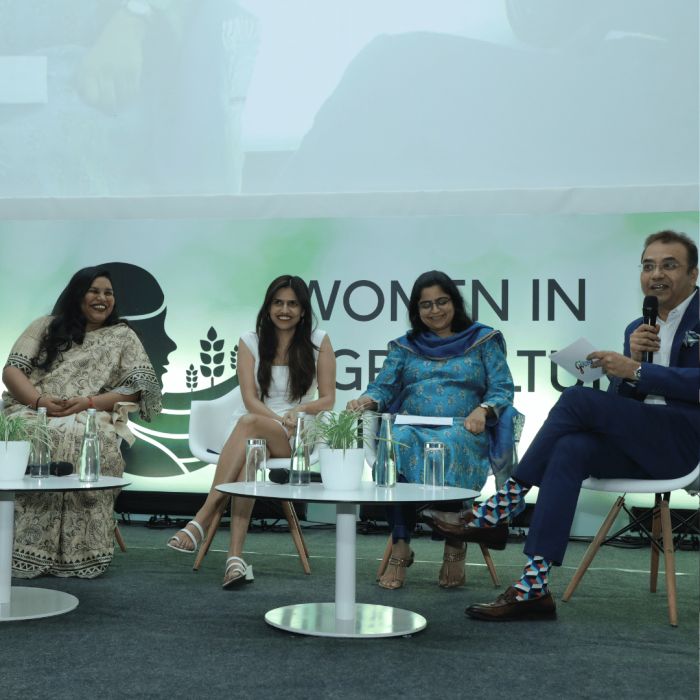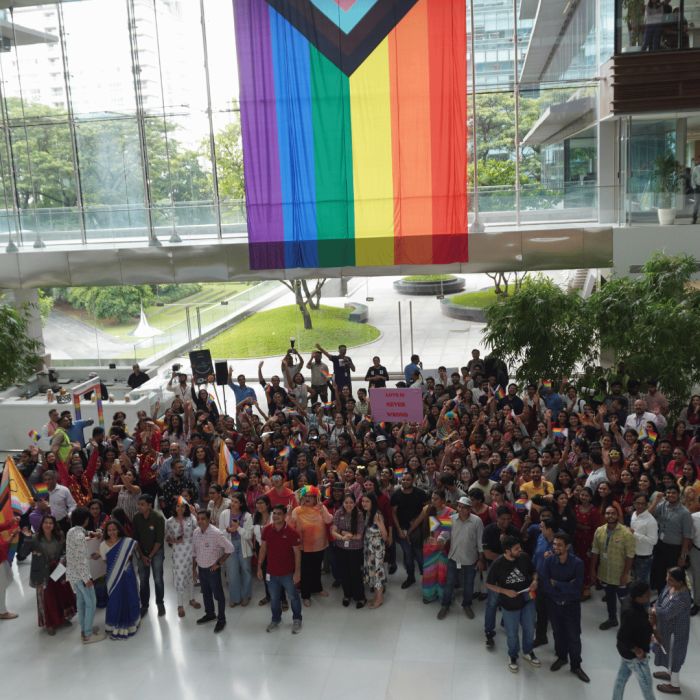
Parmesh Shahani is an author, a corporate leader, and, in his words, a “dot connector”. In 2023, Parmesh founded the Godrej DEI Lab, which helps build and support inclusion ecosystems within the Godrej Industries Group of companies, and focuses on the larger external environment influencing inclusion in corporate India. Prior to this, he founded and ran the Godrej India Culture Lab, an experimental ideas space from 2011 to 2021, and co-conceived a unique campus programme, Godrej LOUD, in 2012. He currently serves as a board member of Khoj International Artists’ Association and Breakthrough Trust, and has been an Aspen Fellow (2024), a TED Senior Fellow (2018), a Yale World Fellow (2014) and a World Economic Forum Young Global Leader (2014). Parmesh’s most recent book, Queeristan: LGBTQ Inclusion in the Indian Workplace was published in 2020, received the CK Prahalad Award for Best Business Book of 2021 and the Laadli Award for Gender Sensitivity for 2021.
Shikha Aleya (SA): Parmesh, a big thank you for agreeing to be interviewed for this issue of In Plainspeak. We’re thrilled to have you in this space, talking about workplaces and sexuality. To start this off, we’d love to know what your first thoughts were when we emailed you about this theme. If you were to approach speaking about this subject today without a single question being asked of you, where would you begin, and why?
Parmesh Shahani (PS): The first thought I had was about how people often tell me, “Oh, why talk about LGBTQ in workplaces, no one talks about being straight!” Or some iteration of this. It’s something I’ve heard over the past 20 years of my work. People don’t understand, so there’s some version of “We don’t rub our straightness in your face, why do you have to rub your queerness in?” Or, “No one talks about straightness,” or some variation of this like, “There’s no straight pride month.” One hears it all the time.
So talking about workplaces and sexuality, one of my first thoughts is this you know, people who read this, they’ll say, “There they go again.” But the truth is, people talk about their sexuality in workplaces all the time. Right? I mean, heterosexuals do. The larger question is, who gets to bring all of themselves to the workplace, and who is either not allowed, or feels scared, or is bullied for doing so? Who has the privilege of bringing their sexuality to the workplace? It is almost certainly straight people. You have that privilege of casually, over lunchtime, saying, “My wife did this”, “My son’s tuition teacher”, “My in-laws”, and so on. Right? People are bringing their sexuality, their heterosexuality, to the workplace all the time. Meanwhile, there is a whole bunch of people, queer and so on, who are constantly holding their thoughts back, or constantly circumscribing what they’re saying for various reasons.
It’s very clearly not a safe space and – because of years of living in Foucault’s Panopticon – they internally feel scared of expressing that as well. In the Panopticon, the prisoner is in a cell open to being viewed from everywhere. The prisoner knows that there is someone in a watchtower watching them and there’s a light that shines on them all the time. So it’s a prison you can leave open, because the prisoners themselves feel scared and don’t run. Big Brother is watching all the time. I think that queer people – because we’ve grown up with this deep sense of not being equal – constantly hold ourselves back.
This is the first thought that came to mind. But the second thought that came to mind when you asked me this, is how much people benefit and flourish from conscious inclusion in the workplace. I thought about my own life, in which I’ve been so privileged, whether it’s been in a grad school like MIT, or whether at Godrej now. When I’ve been at a college or workplace, which has celebrated me for who I am, and where I have been encouraged to bring my sexuality to the workplace, I have flourished. My organisation has told me, “Truly bring your whole self to work, bring your partner to functions, we have policies that benefit you here,” and so on. All the data bears out my experience. There’s now mountains of data about the impact of workplaces that encourage, that are truly inclusive, have diverse talent and inclusive environments. I mean, a major Deloitte report in 2018 said that having a diverse team improved innovation by 20%, and decreased business risk by 30%.

SA: Thanks, that was really interesting and I’m going to be looking up Foucault’s Panopticon after this! Now, just to take a step back from the workplace stage of life. Recently you shared a post on LinkedIn, warmly appreciating business school students you’ve been interacting with for the Godrej LOUD programme. You have written in this post about imagining and co-creating a better world. There have been 12 seasons of Godrej LOUD and the 13th season is on now. Please share a bird’s eye view of some of the transformations LOUD has possibly helped to create in the corporate ecosystem towards inclusion, particularly for the LGBTQ community.
PS: Unfortunately, I’ve been sitting out much of the 13th season because of a painful back injury, but we’ve had senior leaders step in, and it’s a joy to see how the programme’s grown. One of the things I love the most is going to colleges, interacting with students, feeling that energy, and seeing on the ground how much India is fundamentally changing. I’ve written about this experience in my book, Queeristan – it’s magic.
Two things stand out. One is seeing that change I talked about, reflected in these young people. The second is for the students to see someone like me: out, proud, openly talking about their queerness, openly talking about what it means to be at a company like Godrej, which welcomes me for everything that I bring to the table.
So, it’s been a transformative experience. Most companies, when they go to college campuses, do it very differently. The template is that there’s a bunch of business leaders, talking to these students, saying, “Here is a company, here is what we’ve grown, here’s blah, blah, blah…” Instead of doing that, we tell our stories. So, when I go on stage, I talk about what it meant to be a queer kid growing up, what it meant to grow into the person standing before them, doing some of the things that we do at our company. It’s really refreshing. Students get to see employers and managers as real human beings. They get to hear our stories. Being in that space encourages them to share their stories, their dreams, their aspirations. LOUD stands for live out ur dream, and it’s a very different way of hiring students.
For years, we’ve said, let’s flip Maslow’s hierarchy of needs. Let’s not think that you have basic food, clothing, shelter at the bottom and self-actualisation at the top. What if, early in your career, when you’re a college student, you start thinking of what self-actualisation means to you? What would it be like? What would it be like to start living like that? So, (a): what really matters to you? We urge them to find out. And then (b): we tell them that the workplace can be a place for you to self-actualise; you get to work on what really matters to you as part of working in the company, achieving the company goals – all of that. So now they’re really thinking. They’re saying, if you care about animal rights, if you care about creating a better planet, if you care about whatever, bring that to the workplace. And make your workplace blend your interests with the roles that you’re doing. Because the workplace also has to evolve.
We have had students crying in the audience when they hear this. Because when I tell them, tell me what your dream is, so many students have cried and said, things like, “I was so stuck in the rat race of getting 99%, giving IIT JEE, trying to get into an MBA college. I don’t know what my dream is!” So, people cry. People share their innermost thoughts. People come up with incredible talent. Suddenly, sometimes someone will ask for the mic, and they’ll start singing beautifully. The thing is, I think for these college students, the fact that the company comes and talks to them as normal human beings, makes a difference. A company that says, look, tell us what matters. We’re trying to create a company in which we can do what companies do, which is to produce products, services, and so on, and make profits – but alongside that, create an environment in which people who work here are valued, and we care about them. And we want to help them succeed.
What perplexes me is that this shouldn’t be radical. It should be what everyone does, right? But it is radical. Why is it so surprising that an organisation wants to care about them, and help them succeed?
There are so many stories of people coming out. LOUD has been transformative. There are colleges like IIM Trichy, which start their queer groups because of LOUD. So, one year I would go and talk to them, and the next year, they would say, “You are coming for LOUD? Please inaugurate our LGBTQ association; because you came, we got the courage to start.” At IIM Kozhikode, which is another incredible campus, I would go year after year. So one year I went, there was this girl who stood in the corner and just stared at me, didn’t say anything. And you know, you can’t force anyone to speak. Then I went back the next year and she finally came up to me and said, “I was too shy to speak to you last year, but I heard you, and now I have come out, and I am flourishing!”
LOUD has given queer people hope. That you can be yourself. You can be out in the corporate world. You can have a safe space. It has also given straight people a way of really activating their allyship. Because I fundamentally believe that most people are not actually homophobic or bigoted, so we have to show them what allyship looks like. We must give them the training mechanism of here’s how you can be a good friend and support your queer colleagues. If someone comes out to you, how can you hold that for them? And ask, “What do you need?” Most people don’t teach other people how to be allies.
I think more importantly, it comes to them from Godrej, which is an old, respected 127-year-old company. We are not a new-age tech company with our roots in the West. We are a company that has fought in India’s freedom struggle, that has been doing ‘Make In India’ for decades. For most people, it’s kind of like their parents’ and grandparents’ company. So when people see that it’s this company standing up for inclusion, they go home and they tell their family members – look, you know, Godrej is standing up for queer rights. The ripple effects have been quite amazing.

SA: That’s truly brilliant. In fact, my next question has to do with an event hosted by Godrej Agrovet recently. So, workplace is a term that covers massive and diverse terrain. When exploring any one part of this territory, new insights are gained, that may have a larger significance. In March this year, Godrej Agrovet hosted the Women in Agriculture Summit, to bring attention upon women in India’s agricultural sector. I realised as I read about this, that I did not know that “women make up 63% of India’s agriculture workforce.” What, for you, were some new, emerging narratives from this event?
PS: This was actually very good. It’s something that we plan to do every year, because we think it’s very important. What’s amazing is that an overwhelming number of Indian women who work in India, do so in agriculture. But it’s so it’s so underreported and poorly understood in the broader discourse. Understanding women in agriculture is important to Godrej Agrovet, and they understand that it’s very important to the Indian economy in general. Why is the labour of women in agriculture not translating into better wages for them? Why is the informal employment of women in agriculture not being converted to formal employment? Most big agri-business companies are finding it very hard to attract women into the sector. But we know that in the informal part of the sector, there is so much talent. What is the barrier between informal and formal? We know some of the answers, of course. But I think the summit in terms of convening people from businesses, from academic spaces, from NGOs, it really helped us understand the potential for change.
The 2024 summit was the first one. I hope you come for the next one because we’ve collaborated with a major Indian academic institution to study these structural barriers, and we are going to release some of the findings next year.
We believe that, you know, the Indian economy in general will not be able to progress, how are people going to be buying, say, soaps or houses or other things if agriculture, which is where the majority of Indians still work, is not flourishing as well? So, we believe it’s really vital to understand some of the challenges and then, as a company, participate in creating some of the solutions.
SA: In a collaborative social media post with Ladies Who Lead, you raised a vital point, on the theme of co-creating an equal future: “Don’t think of gender as just a silo. Gender intersects with many other spaces as well, and all our identities are composites of all our various privileges and challenges that we’ve encountered and grown up with”. This is an idea that is becoming more widely discussed in some environments, which may be urban, perhaps primarily English speaking, and increasingly familiar with social justice themes. The question is, where do you think we should go from here, and how?
PS: The first thing is I’m glad that finally in English speaking urban communities, conversations about intersectionality and social justice are arriving. These conversations are the lived realities of most people in our country, but I’m so glad that finally they are here. Caste, class, and feminist activism are not something that have been discovered yesterday. If you come from a historically excluded community, you have always felt intersectionality operate in a very visceral way. It’s these existing conversations that are now expanding into more elite spaces, especially in the corporate world where I am located, where I’ve chosen to work.
And I’m glad that companies are trying to understand and create policies and benefits which are more inclusive and are understanding the win-win nature of some of these. For example, in Tamil Nadu, where Godrej Consumer, one of our businesses, is starting a new factory, the state is very committed. They’ve made it clear in their conversations with industry that they want to bring about inclusive development. It has to be with inclusion. So we committed that 50% of all hires in the factory would be women and 5% People with Disabilities (PWDs) and LGBTQ+ people.
Look at other states. One of our other Godrej Consumer factories is in Malanpur in Madhya Pradesh, where we’re currently expanding in a huge way. It is easier to find women to work in a factory in Tamil Nadu than it is in MP, simply because Tamil Nadu has a history of more women working. What happens when that history doesn’t exist? You have to really work with families, you have to work with society, you have to really push. And in Malanpur, as more and more women come into the workplace, you realise that women who are working in factories, for the first time, have previously been part of the agricultural workforce from historically excluded communities. For them, a job in a factory is an opportunity to enter the formal sector and advance. Saurabh Jhawar, one of our Godrej Consumer leaders, who is one of the people spearheading the factory projects, has also said that along with gender, we must widen the net to include all kinds of diversity.
Across India, I’m seeing companies, I’m seeing states, I’m seeing leaders within companies, like Saurabh, making this commitment. If you want to advance women in workplaces, if you have an understanding of how these dimensions connect with each other in a country, it means that you can create other kinds of inclusion. Overall, I’m really glad that finally, these conversations are happening in corporate India. There are no easy answers or solutions, but I’m happy the conversations have begun.
Finally, there are interesting, targeted interventions. For example, do you know the work of LedBy Foundation, run by Dr. Ruha Shadab? Their aim is to accelerate the progress of Muslim women leaders in the country, because Muslim women are historically less represented in leadership. So they’ve created this incredible fellowship programme in which they take really smart, talented women from the community and prep them for leadership. I’m very intrigued by the fact that companies are thinking at this scale, and the fact that there are programmes like LedBy in which civil society organisations are thinking about how to solve some of these challenges.
Also, our policies in the corporate space have been evolving to keep up with our understanding. So many companies in the past year or so, have come up with a more nuanced understanding of care. So, for example, we and many other companies earlier would have maternity and paternity policies. But we’ve changed that completely at Godrej recently, because we have changed our thinking around gender. So now we have primary and secondary caregiving policies. If you’re a mom or a dad who’s just had a newborn, biological baby, we’re thinking of how to support you better. But our policies are also for non-traditional families, for parents who don’t fit the usual mould, for adoptive children, and much more. Godrej and other companies have specific trans benefit policies, which include coverage for gender affirmation, as well as annual hormones and things like that. All this is to say that while there’s so much more work to do, I think people in the corporate world are finally understanding the dimensions and the nuances that come with taking an intersectional lens and are trying to come up with solutions.

SA: Parmesh, thank you for your warmth and generous engagement here. A last question zooming in on the theme of sexuality, sexual orientation and the workplace. From your experience, what have been some of the most challenging behaviours and attitudes you have witnessed at a workplace when facilitating these conversations? What helps shift the balance towards support, acceptance of diversity and creating a safe space for all?
PS: I’ll tell you about two challenging behaviours and what has helped me shift the balance. The first behaviour is because people are very afraid of the unknown and they’re afraid of change. So, people prefer the status quo. And what that means is that anytime anyone proposes a new idea, a way to take things forward, they do what I call devil’s-advocate-giri. It is normally a person who will stand up and say, “Let me play devil’s advocate for a minute”. Maybe you’ve been at meetings like this. And then they will want to squash your idea. And you know that their squashing is not coming from any rational place. It’s coming out of fear of the unknown. Will I lose my place? So, for example, if you say, let us have trans benefits and anyone who wants to transition, our policy should include gender affirmation. Then someone will say, “But what if a hundred trans people join us and all of them want to undergo gender affirmation surgery at the same time?” At which time you have to push back and say, “So what? Isn’t it a good thing if more trans people join us? Why would they all want to undergo surgery at the same time? If we can support our trans colleagues through their journey, they will continue to be with us and they will continue to be amazing.”
That’s the first challenging behaviour – a bunch of devil’s advocates. And I think the way to work around that is by using both carrot and stick. Teaching colleagues, helping them learn, how to make that fear of the unknown go away – this has really worked, as has incentivising good behaviour. For example, saying that if you meet these inclusion goals, you will get this. People do this in multiple ways. For example, from this year on, all senior leaders at Godrej, anyone who is above vice president, have 15% of their goals pegged to inclusion and sustainability. You’re trying help your colleagues understand that when you create a more inclusive organisation, you profit materially, you become more innovative, and you help to create a more inclusive India and world. It is truly a win-win scenario!
The second challenging behaviour, I think, is how many times people talk about inclusion in the abstract. And since most people who are in the corporate world come from non-diverse backgrounds, it’s very abstract for them. What I’ve found is that making it personal works. If you’re a cis hetero able-bodied man, and you don’t have friends who are, say, queer or disabled, or from different religions or backgrounds, then it’s an abstract thing to say “Let’s make the world better,” because everyone you’re seeing around you is like you. Personalising it really works. And I do all kinds of things to personalise it. At leadership conferences, I bring queer performers and their parents who talk about accepting their queer children. So to all of the leaders sitting there, the question is, “What if your daughter is lesbian, then what will you do? Do you want her to grow up in a world in which she’s treated differently?” I show them films. We do plays. We have conversations. I even do things like record videos with their children saying, “Hi, Papa. Did you know that this is the number of women participating in the workforce in India? Don’t you want to use your position of power to make a difference?” I play those videos back to them in public. Then people say, oh, it’s not some abstract thing, it’s something that my family cares about. It’s something that my daughters care about.
I call this the hardware and software of change. Hardware is policies and so on. The software is this conversation, the culture. I think many organisations that fail fixate only on the hardware. So they say, I’ve changed my policy, now magic will happen. No, baba. Magic doesn’t happen automatically. You have to constantly work on it.
Say, you have someone who’s blind working in your team, you will order the software needed for them to succeed. And then you will know with JAWS on their computer, they can analyse data the same way as anyone can using Excel. When you have someone using a wheelchair, you will get a ramp, you will figure that out. When you have someone who’s queer, and over lunch, you are saying my wife did this, someone will say my partner did this, and you will normalise it. That’s the software. That’s the culture. And when you see queer people, or people with disabilities, or people with different body types or people of colour, or so on in your ads, it’s comprehensive. I think working towards that comprehensive approach using both hardware and software, is key.
Photos provided by Parmesh Shahani.